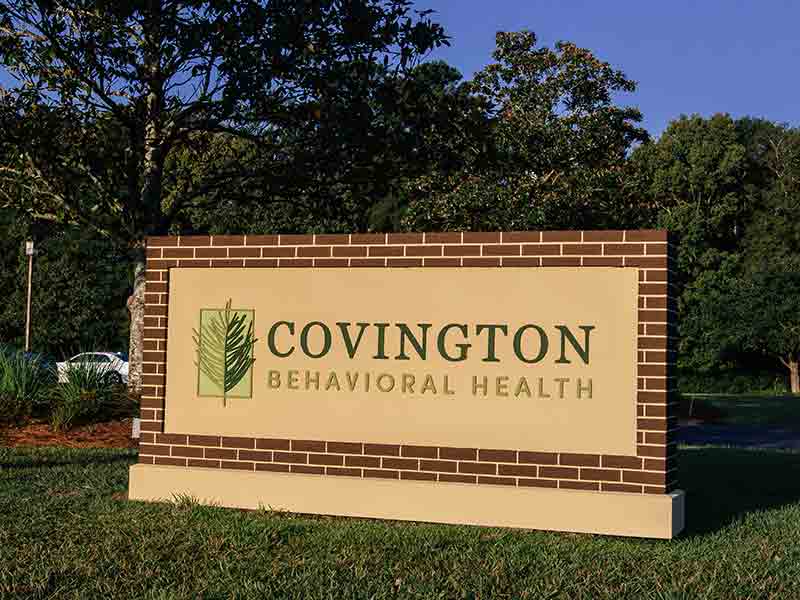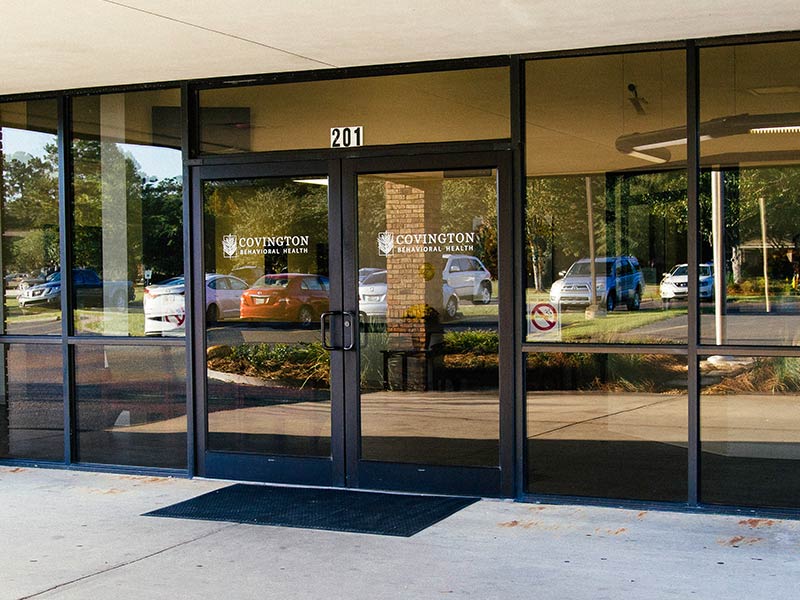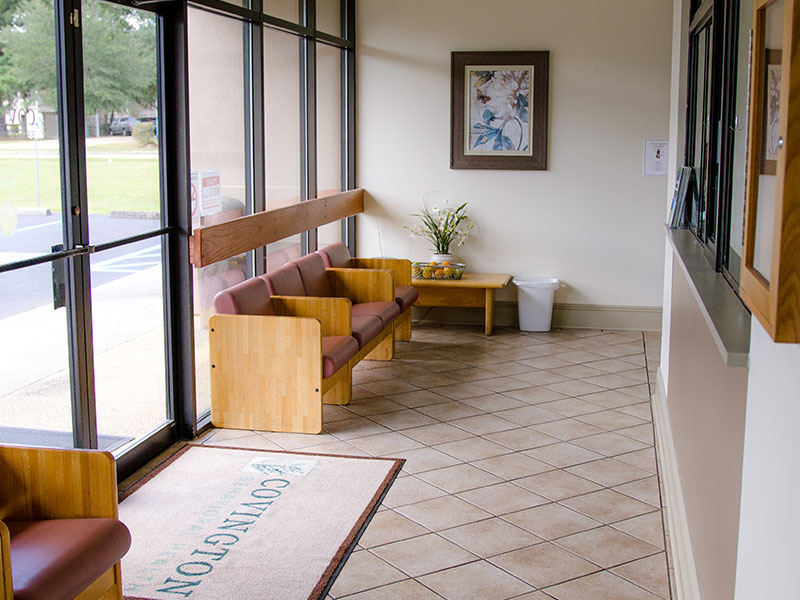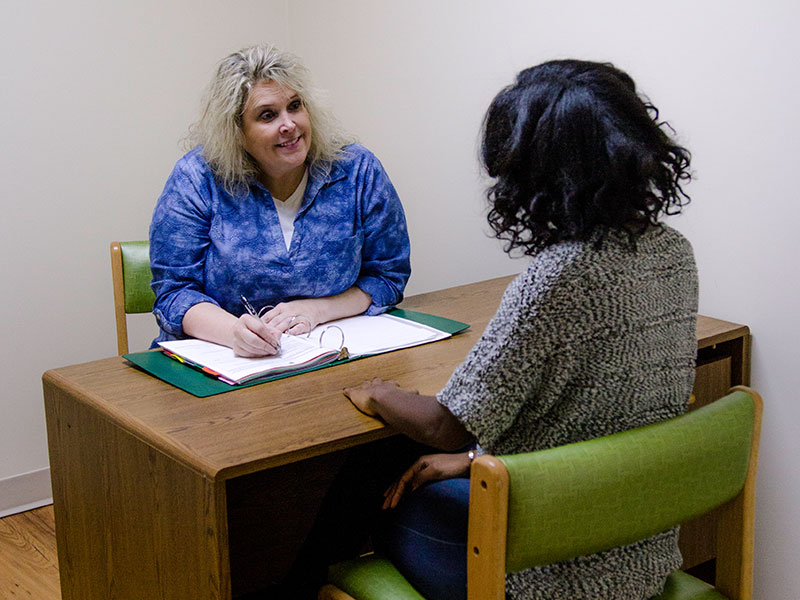At Covington Behavioral Health, individuals can receive expert care delivered by a team of compassionate and experienced professionals. With the help of our center’s dedicated treatment team, it is possible to learn to manage suicidal ideation symptoms and live a healthier, happier life.
Suicidal Ideation Treatment
Learn more about suicidal ideation treatment at Covington Behavioral Health in St. Tammany Parish
Suicidal ideation is a broad term that refers to thinking about ending one’s own life. Thoughts that fall under the description of suicidal ideation range from one brief thought about killing oneself up to making specific plans for how, when, and where to end one’s own life. In addition to being a serious issue on its own, suicidal ideation is also often evidence of an underlying problem. For example, suicidal ideation may occur as a direct result of an extremely upsetting experience or may be symptomatic of a mental health disorder such as a depressive disorder or posttraumatic stress disorder (PTSD). Clearly, the more often a person engages in suicidal ideation, and the more specific he or she is about the details of ending his or her own life, the more dangerous the behavior becomes. However, no case of suicidal ideation should ever be dismissed or not taken seriously.
At Covington Behavioral Health, we are extremely familiar with the many potential causes of suicidal ideation, and we have considerable experience helping people who have thought about or even attempted to die by suicide. The talented and dedicated members of our multidisciplinary treatment teams at our hospital are prepared to provide life-affirming and possibly lifesaving care that will empower you to overcome thoughts of suicide and learn to live a healthier and more satisfying life.
How to Help a Loved One
Helping a loved one get treatment for suicidal ideation
If someone you love has been considering suicide, you are right to be concerned. You may also be frightened and alarmed, and while these are understandable responses as well, you cannot allow your fears to stop you from taking action. Please consider the following:
- First, you must ensure your loved one’s safety. There is no harm in directly asking him or her if he or she is thinking about committing suicide. Thoughts or expressions of wanting to commit suicide should always be taken seriously. If you fear that your loved one is in danger of harming him- or herself, get help from a trained professional immediately.
- If your loved one is not actively considering suicide, but has had such thoughts in the past, he or she may still be in danger. Talk to him or her. Ask what preceded the suicidal ideation, and discover if this was a one-time occurrence or if he or she has had repeated thoughts of suicide. In addition to getting valuable information, talking to your loved one is also an ideal opportunity to express your concern and to let him or her know that support is available.
- Look into the types of treatment centers and hospitals that have helped others who struggled with suicidal ideation, and who may have also been experiencing other problems that you know your loved one has dealt with. Identify centers and hospitals that appear to be the best fit for your loved one.
- Talk to your loved one about getting treatment. Reiterate your support, but be clear that the issues that he or she is dealing with require professional help at a hospital or center for suicidal ideation. Make certain to clarify that your loved one is not being a burden to you. Instead, emphasize that he or she is important enough that you want to do all you can to make sure that he or she gets the best possible care.
- While your loved one is in treatment at his or her chosen center or hospital, be an active source of support. Take advantage of family therapy, family support services, and other opportunities to remain involved in your loved one’s life while also learning how best to provide ongoing support after he or she has completed treatment and returned home.
Remember that suicidal ideation is often a symptom of an underlying condition and recovery from that condition may be a long-term process in which residential care may just be one step in that long-term process. Be prepared to provide ongoing support to your loved one, and be sure that he or she knows that he or she can rely on you.
Why Consider Treatment
Why consider treatment for suicidal ideation at Covington Behavioral Health in St. Tammany Parish
As indicated earlier on this page, suicidal ideation can be a one-time experience following a traumatic or otherwise particularly upsetting event. However, in many cases, thoughts of suicide are symptoms of a mental health disorder such as depression, PTSD, and certain other conditions. To address both the immediate risk to life and the potential for continued harm due to an underlying mental health disorder, suicidal ideation should always be taken seriously. If an individual’s thoughts of suicide are related to a mental health disorder, failing to get treatment exposes the individual to continued risk for psychological distress. Left untreated, mental health disorders may cause individuals to act in unsafe ways, including abusing alcohol or other drugs as a means of self-medication. An untreated mental health disorder and continued suicidal ideation may prompt a person to withdraw from family and friends, which can lead to family discord and the loss of essential sources of support. Without this support, the afflicted individual may fail to meet his or her academic, occupational, social, and financial responsibilities, which can lead to diminished self-worth, increasing despair, and a heightened risk that the individual will act upon his or her suicidal thoughts. With effective treatment at a quality program such as Covington Behavioral Health, men and women can receive the care that they need to end their suicidal ideation recover from the issues that may have led to such thoughts in the first place.
Types of Treatment
Types of suicidal ideation treatment offered at Covington Behavioral Health in St. Tammany Parish
Covington Behavioral Health is a 104-bed residential treatment center that provides personalized, comprehensive care for adolescents ages 10-17 and adults age 18 and older who have experienced acute changes in their emotional and mental well-being and need psychiatric stabilization.
At Covington Behavioral Health, care for people who have been struggling with suicidal ideation is provided by multidisciplinary teams of talented and dedicated professionals, including psychiatrists, medical psychologists, nurses, nurse practitioners, social workers, counselors, activity therapists, and mental health technicians. Among the members of our center’s staff who have specialized training are our full-time staff dietitian, social workers who are certified in gerontology, and physicians certified in forensic psychiatry and addictionology.
The care that our patients receive at our center incorporates a variety of treatment techniques and therapeutic modalities, including cognitive behavioral therapy (CBT) and dialectical behavior therapy (DBT). We place a premium on conducting thorough assessments on each patient at Covington Behavioral Health to ensure that we are able to develop individualized treatment plans that address each person’s specific strengths, needs, and treatment goals.
Each patient’s time at Covington Behavioral Health will be a unique experience based upon his or her specific strengths and needs. Depending upon those unique factors, a patient’s treatment at our center may include the following elements:
Medication management: Some individuals who have been experiencing suicidal ideation may benefit from having certain prescription medications incorporated into their treatment plans at our center. Covington patients who meet this description will have the opportunity to meet with our psychiatrist and nursing staff on a regular basis to receive medication management services.
Detoxification: Covington Behavioral Health is not a substance abuse treatment center; however, we do understand that prospective patients may have struggled with substance abuse in addition to their challenges with suicidal ideation. To best serve these individuals at our center, we provide detox services for individuals who been abusing alcohol, prescription painkillers, and certain other drugs. After they have rid their bodies of the substances that they have been abusing, detox patients will transfer directly into residential treatment to receive care for their mental health disorders.
Individual therapy: Patients in the inpatient program may meet with a member of our social service staff (LCSW, LMSW, LPC, or PLPC) or nursing staff (RN or LPN) for individual therapy as needed. Individual therapy allows patients to address issues that they may be hesitant to bring up during group sessions, provides them with one-on-one feedback and guidance from experienced professionals, and helps them to develop effective skills for eliminating the urge to entertain thoughts of suicide.
Group therapy: Group therapy sessions are fundamental elements of treatment at Covington Behavioral Health. Group therapy provides a structured yet dynamic environment in which participants at our center can share their insights and experiences, learn from the contributions of fellow patients, and practice healthy interpersonal skills such as effective communication, empathy, and giving and receiving support. The following are among the groups that a patient who is being treated for suicidal ideation may participate in during his or her time at Covington:
- Activity groups
- Creative therapy groups
- Dietary groups
- Process groups
- Psychoeducation groups
Group therapy sessions, which are typically offered at least five times during each treatment day at our center, are led by nurses, activity therapists, mental health technicians, and members of our social services staff.
Family therapy: At Covington Behavioral Health, we understand that an individual’s struggles with suicidal ideation may impact his or her entire family. With family therapy, loved ones of Covington patients have the opportunity to address how they have been affected by the patient’s mental health problems, learn how to strengthen family bonds and improve intra-familial relationships, and develop the skills that will allow them to provide the best possible support as their loved one continues in recovery following the residential phase of his or her treatment. Family therapy sessions at Covington Behavioral Health are typically conducted by the patient’s case manager and may be scheduled on an as-needed basis or by request.
Discharge planning: We provide robust discharge planning services to ensure that each patient and his or her family has a thorough plan that identifies the referrals, community-based services, and other support services that will put the patient in the best position to maintain and improve upon the progress that he or she made while in treatment for suicidal ideation at our center.
At Covington Behavioral Health, our ultimate goal is to provide the focused, effective, and personalized care that can improve the quality of life for all who are entrusted into our care. For more information about our services, please do not hesitate to contact us at your convenience. We look forward to answering all of your questions and helping you determine if Covington Behavioral Health is the perfect place for you or your loved one.















